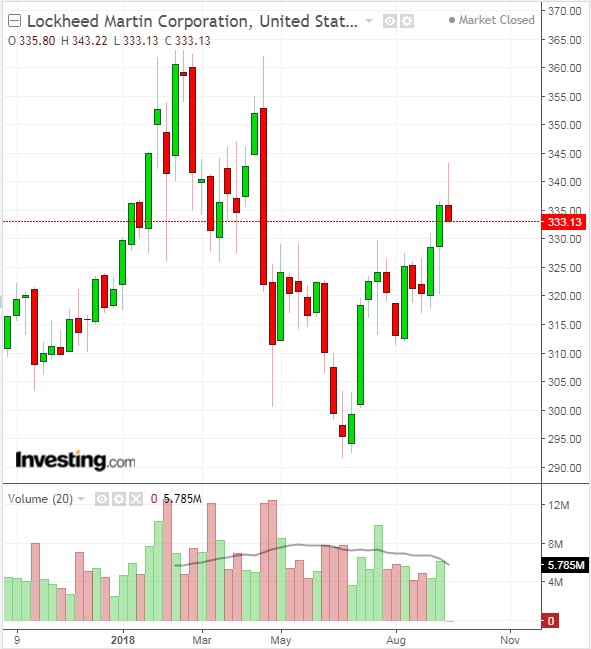After some recent volatility, shares of Lockheed Martin (NYSE:LMT) are well off their highs. But with production problems and the possibility of a change in Congressional leadership from defense-spending friendly Republicans to a possible Democratic majority, it’s better for investors to proceed with caution.
Although not always the case, Republicans have historically been more favorable towards spending on defense. So it came as no surprise that immediately following the election of President Donald Trump, major defense companies like Lockheed Martin, Northrop Grumman (NYSE:NOC) and General Dynamics (NYSE:GD) saw their stock prices rise. In November 2016 alone, these three companies experienced average growth of 12% compared to right before the election.
But since hitting a high of $363 a share in February, Lockheed's stock has experienced significant volatility. In June, Lockheed's stock was about 18% off its high. Shares, which closed at $333 at the end of yesterday's session, are now down around 8% from the high.

For any investor considering adding Lockheed to their portfolio, it's crucial to know that it's a pure defense play. In the second quarter, 71% of its $25 billion in net sales came from the US government, 28% was from military sales to international customers and only 1% was driven by US commercial and other customers.
Thanks to Senate Majority Leader Mitch McConnell's push, earlier this year a bipartisan $717 billion defense budget was signed into law. But if Democrats take control of the House and Senate in November, these gains could be discontinued, negatively impacting the market according to Goldman Sachs.
Moreover, because the US political environment is so acrimonious, if Democrats gain control, they could try to impeach Trump. This will almost certainly lead to market volatility, particularly for the defense sector.
F-35 Fighter Problems
According to its 2017 Annual Report, Lockheed's F-35 stealth fighter accounts for 25% of its total consolidated net sales and 64% of the aeronautics division's net sales (Lockheed's strongest segment). Further, the F-35's contribution to Lockheed's net sales is expected to grow as the total cost of the F-35's 55-year lifespan is currently projected at $1.5 trillion.
This would be great if it weren't for the significant issues surrounding the combat aircraft. Over the course of its development, the F-35 has missed deadlines, cost billions more than projected and had its capabilities criticized by watch groups, the military and industry experts. As a result, Lockheed has received disapproval from both sides of the Congressional aisle and earlier this year Trump called the fighter program "out of control."
Luckily, Lockheed seems to have turned a corner and reported in its Q2 that the F-35 had achieved a number of important milestones. As well, right now the F-35 is in the Low Rate Initial Production (LRIP) phase, but over the next three years it's expected to move to full-rate production. This is projected to decrease costs significantly, according to Forbes.
Still, Lockheed itself states in its Q2 that there are a number of F-35 program challenges ahead, so even with the recent positive news, the fighter plane's progress should be closely monitored. As of this writing, Lockheed's strongest business segment remains aeronautics, with, according to LMT's Q2, net sales of a little more than $5.3 billion. Lockheed's next strongest business segment, rotary and mission systems, reported a little less than $3.7 billion in net sales. Additionally, Lockheed currently has a strong backlog of $109 billion.
As well, the company failed to capture the Next Generation Strike Bomber contract, which went to Northrop Grumman. Additionally, when it comes to future acquisitions of this type, there's nothing on the horizon.
Boeing (NYSE:BA) is already developing the next-generation tanker, Lockheed currently has the next-generation fighter, and Northrop is developing the next-generation bomber. As such, Lockheed is strongly relying on its current airframes—the F-22, F-35, C-5 and C-130—to drive aeronautics revenue.
The good news is that Lockheed is in a strong position for acquisitions the Pentagon deems high priority: hypersonic missiles. According to the US Naval Institute, both China and Russia are working to develop hypersonic missiles. To counter this, the Pentagon and Department of Defense (DoD) have made hypersonics a priority.
To that end, in April, the US Air Force awarded Lockheed an almost-$1-billion contract to develop a hypersonic cruise missile prototype. Then, in August, Lockheed won another contract worth an estimated $480 million for a second hypersonic prototype. As Defense News puts it, these wins could set Lockheed up to become a "hypersonics-manufacturing powerhouse."
Bottom Line
There are significant problems in Lockheed's future, but there's also an upside. First, right now polls suggest that Democrats have a good chance of retaking the House, but not the Senate. Second, most analysts rate Lockheed a buy and give it a price target of a little more than $377 a share. Third, Lockheed has positioned itself well to benefit from what the Pentagon and DoD deem high-priority projects.
How the upcoming election will play out is anyone's guess. Therefore, it's our view that Lockheed's upside doesn't fully outweigh the current downside. So, while we wouldn't recommend bailing if you already own the stock, investors should proceed with caution when considering adding Lockheed to your portfolio just now.
